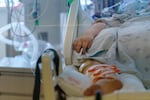Health officers for three Portland metro area counties issued a warning on Thursday, saying the omicron variant of the coronavirus is poised to disrupt hospitals, childcare, business and public services in the coming weeks.
They said that while vaccines remain excellent protection against severe illness, the omicron variant behaves very differently from previous strains.
Many vaccinated and even boostered people will get mild infections and may need to stay home and quarantine to avoid infecting others.
Multnomah County health officer Dr. Jennifer Vines said case counts in the metro area have been doubling week over week, and there are concerning signs that, while most omicron infections are mild, hospitalizations are rising too.
“EMS calls are up 40%. At least one large Portland emergency department was physically out of space,” Vines said.

A patient in the intensive care unit at Oregon Health and Science University during last August's COVID-19 surge.
Kristyna Wentz-Graff / OPB
That emergency room is located at the Portland Providence Medical Center in Northeast Portland, according to Multnomah County spokesperson Julie Sullivan-Springhetti.
A spokesman for Providence said the hospital’s capacity issues were not unique and clarified that no one who needed care was turned away.
“In the past week, every emergency department in the Portland area has been running at or near capacity,” said Providence Spokesman Gary Walker. “Emergency departments continue to see everyone who comes through our front doors for care, even when ambulances are being diverted or redirected.”
On Thursday, the Oregon Health Authority reported more than 7,615 newly diagnosed COVID-19 cases, a new pandemic record, and the fourth consecutive record-setting day. The number is an under count, given the lack of access to PCR testing and the widespread use of at-home antigen tests, which don’t trigger any report to public health.
Hospitals reported 588 people in care who tested positive.
Related: Will omicron overwhelm Oregon’s hospitals? Here’s what we know so far
The Multnomah, Washington and Clackamas county public health departments also announced they will no longer do contact tracing and case investigations for individual cases.
People infected with omicron become contagious and symptomatic more quickly than people with earlier variants, PCR testing is hard to come by, and at-home test results aren’t reported to public health departments. As a result, contact tracing doesn’t really work, the health officers said.
“It’s kind of like bringing a snow shovel to a tornado. It’s a great tool, but not the right tool,” said Dr. Sara Present, Clackamas County health officer.
Instead of expecting a call or individual follow-up if you test positive, the public health departments are asking people to seek information from the health system that conducted the testing, or to follow online recommendations from county, state, and federal public health authorities.
Some public health staff on case investigation teams are being reassigned to work on the effort to get more people vaccines and boosters, and others will focus on investigating outbreaks in high-risk settings.
The public health officials said most people should expect to encounter the virus this month.
People ages 50 and up — as well as people with underlying health conditions — are at a higher risk for severe illness, officials said. They should take extra precautions and ask people they spend time with to do the same.
Most critically: get up to date on booster shots, wear a well-fitting mask around other people and limit unnecessary gatherings.
People should have a plan in place in case they get sick.
People who are at a higher risk of infection because of their age or health conditions should call their health provider if they get sick.
People who are 50 years and younger are most likely to have mild, cold-like symptoms and recover at home.
With testing supplies limited, people with COVID-19 symptoms should assume they have the virus, whether or not they can get confirmation.
That means isolating away from others for at least five days, according to U.S. Centers for Disease Control and Prevention guidance. Stay in a separate room and use a separate bathroom, if possible. Stay hydrated and rest. Wear a good mask, including around household members, for a full 10 days, and avoid contact with people at risk of severe disease for 10 days.
The health officers said they don’t anticipate any further mandatory restrictions on business or gatherings, but they ask people to consider postponing large gatherings or moving them online.
Editors note: This story has been updated to clarify that Providence Portland did not turn anyone seeking emergency care away on Tuesday.


